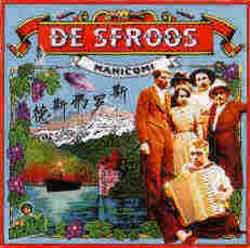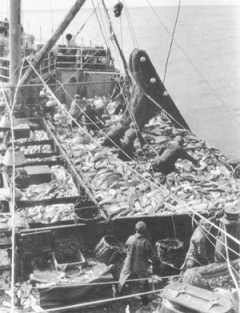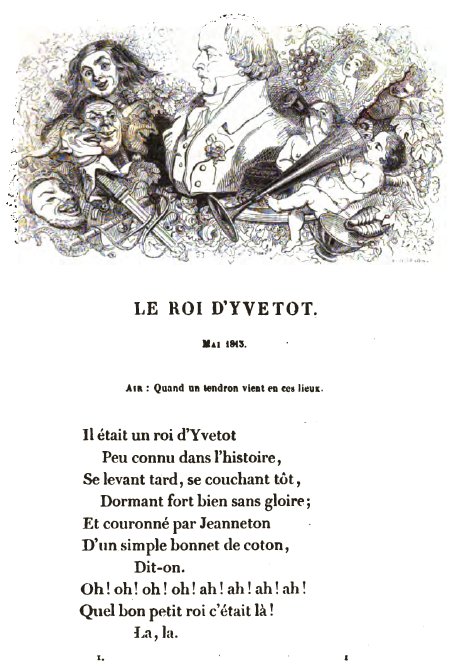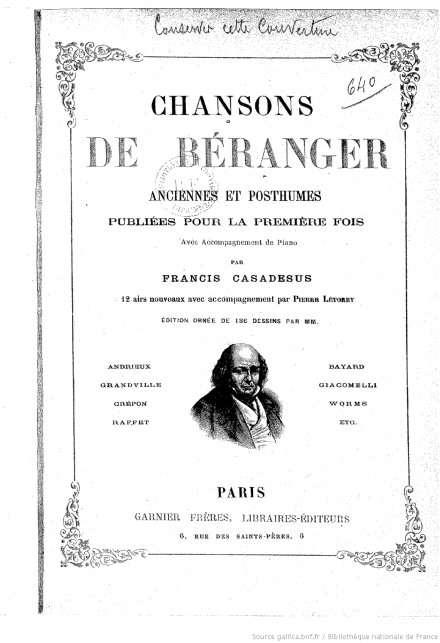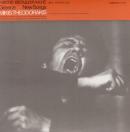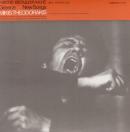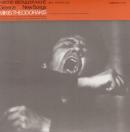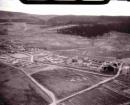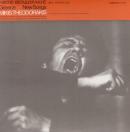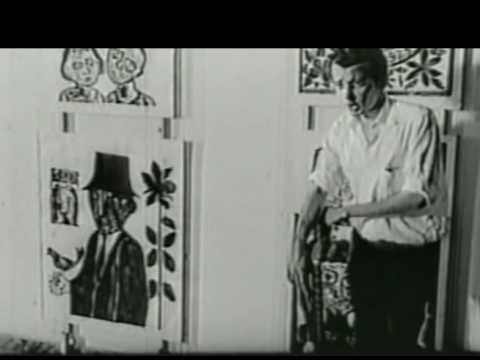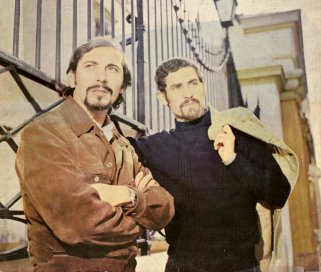La torre di Babele

Chanson italienne – La Torre di Babel – Edoardo Bennato - 1976
Regarde un peu, Lucien l'âne mon ami, voilà qu'ils vont refaire la Tour de Babel. Aux dernières nouvelles d'ailleurs, dans un lieu sans intérêt (sauf bancaire), au milieu de nulle part, dans un désert situé entre le vide de terre et le vide de mer, ils ont construit une tour de plus de huit cents mètres de haut... et voilà qu'elle s'écroule, je veux dire commercialement – on ne peut la vendre... Malheureux riches, malheureux financiers...
Oui, c'est çà, et quoi encore, tu ne vas pas les plaindre... dit Lucien l'âne aux pieds de lave dure, aux pieds de basalte que rien ne décourage. D'ailleurs, je te fiche mon billet (de banque) qu'il y aura bientôt un crétin majuscule qui voudra une tour plus haute encore, d'au moins un kilomètre... Suivi d'un autre qui essayera d'atteindre deux kilomètres, et ainsi de suite... La bêtise... (Continues)
Regarde un peu, Lucien l'âne mon ami, voilà qu'ils vont refaire la Tour de Babel. Aux dernières nouvelles d'ailleurs, dans un lieu sans intérêt (sauf bancaire), au milieu de nulle part, dans un désert situé entre le vide de terre et le vide de mer, ils ont construit une tour de plus de huit cents mètres de haut... et voilà qu'elle s'écroule, je veux dire commercialement – on ne peut la vendre... Malheureux riches, malheureux financiers...
Oui, c'est çà, et quoi encore, tu ne vas pas les plaindre... dit Lucien l'âne aux pieds de lave dure, aux pieds de basalte que rien ne décourage. D'ailleurs, je te fiche mon billet (de banque) qu'il y aura bientôt un crétin majuscule qui voudra une tour plus haute encore, d'au moins un kilomètre... Suivi d'un autre qui essayera d'atteindre deux kilomètres, et ainsi de suite... La bêtise... (Continues)
LA TOUR DE BABEL
(Continues)
(Continues)
Contributed by Marco Valdo M.I. 2010/3/18 - 16:57
Harriet Tubman

[1977]
Album “Lifeline” (1983)
Scritta da Walter Robinson.
Testo trovato su The Mudcat Café
Ancora una canzone dedicata alla Mosè Nera, alla regina dell’“Underground Railroad”, alla ”General” Tubman…
Album “Lifeline” (1983)
Scritta da Walter Robinson.
Testo trovato su The Mudcat Café
Ancora una canzone dedicata alla Mosè Nera, alla regina dell’“Underground Railroad”, alla ”General” Tubman…
One night I dreamed I was in slavery
(Continues)
(Continues)
Contributed by Alessandro 2010/3/18 - 14:35
Song Itineraries:
Racism and Slavery in the USA
Harriet Tubman's Ballad
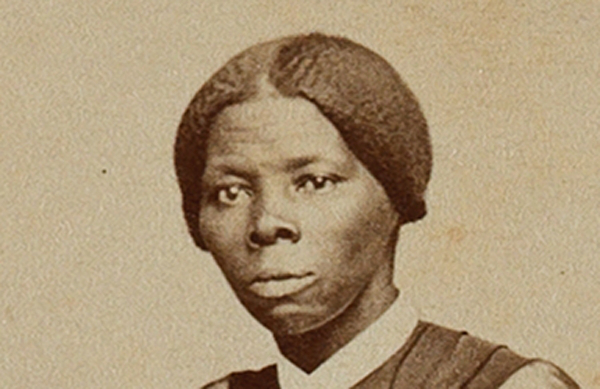
[1944]
Album “Long Ways to Travel: The Unreleased Folkways Masters, 1944-1949”, Smithsonian Folkways Recordings, 1994.
(Testo trovato su The Mudcat Café)
Nel 1944 Guthrie lesse il libro di Earl Conrad intitolato “Harriet Tubman: Negro Soldier and Abolitionist”, dedicato alla figura della celebre afroamericana che, dopo essersi liberata dalla schiavitù, spese molti anni della sua vita come “smuggler”, come conducente dell’”Underground Railroad”, aiutando centinaia di schiavi neri a fuggire verso la libertà e, più tardi, aiutò John Brown a pianificare gli attacchi armati contro i proprietari schiavisti in Virginia, meritandosi il soprannome di “General Tubman”.
La storia di questa donna coraggiosa colpì molto Guthrie, che nel settembre dello stesso anno scrisse su di lei questa canzone biografica, da cantarsi sulla melodia della popolare “Kansas Boys”.
Album “Long Ways to Travel: The Unreleased Folkways Masters, 1944-1949”, Smithsonian Folkways Recordings, 1994.
(Testo trovato su The Mudcat Café)
Nel 1944 Guthrie lesse il libro di Earl Conrad intitolato “Harriet Tubman: Negro Soldier and Abolitionist”, dedicato alla figura della celebre afroamericana che, dopo essersi liberata dalla schiavitù, spese molti anni della sua vita come “smuggler”, come conducente dell’”Underground Railroad”, aiutando centinaia di schiavi neri a fuggire verso la libertà e, più tardi, aiutò John Brown a pianificare gli attacchi armati contro i proprietari schiavisti in Virginia, meritandosi il soprannome di “General Tubman”.
La storia di questa donna coraggiosa colpì molto Guthrie, che nel settembre dello stesso anno scrisse su di lei questa canzone biografica, da cantarsi sulla melodia della popolare “Kansas Boys”.
I was five years old in Bucktown Maryland
(Continues)
(Continues)
Contributed by Alessandro 2010/3/18 - 13:55
Freedom's Star
Anonymous
[18??]
Attribuita a tale “Harris”, certamente uno schiavo.
Sull’aria di una canzone intitolata “Silver Moon”.
Il brano è presente in un libretto di canti abolizionisti pubblicato dall’editore Bela Marsh a Boston nel 1848 e intitolato “The Anti-Slavery Harp”, curato da William Wells Brown (1816-1884), un afroamericano nato in schiavitù nel Kentucky, fuggito al nord attraverso la “Underground Railroad” (di cui egli stesso fu guida) e diventato poi un importante scrittore, commediografo, storico e figura di spicco, insieme a Frederick Douglass del movimento abolizionista.
Anche questa canzone, come altre presenti sulle CCG/AWS (Harriet Tubman, Follow the Drinking Gourd, Go down, Moses), racconta della fuga degli schiavi neri dal sud verso il nord degli States, verso la libertà, guidati dalla Stella Polare e da quei coraggiosi fra loro che per decenni, prima dell’abolizione della schiavitù, si adoperarono – rischiando spesso la vita – nell’aiutare altri neri a fuggire dalle grinfie di negrieri e padroni schiavisti…
Attribuita a tale “Harris”, certamente uno schiavo.
Sull’aria di una canzone intitolata “Silver Moon”.
Il brano è presente in un libretto di canti abolizionisti pubblicato dall’editore Bela Marsh a Boston nel 1848 e intitolato “The Anti-Slavery Harp”, curato da William Wells Brown (1816-1884), un afroamericano nato in schiavitù nel Kentucky, fuggito al nord attraverso la “Underground Railroad” (di cui egli stesso fu guida) e diventato poi un importante scrittore, commediografo, storico e figura di spicco, insieme a Frederick Douglass del movimento abolizionista.
Anche questa canzone, come altre presenti sulle CCG/AWS (Harriet Tubman, Follow the Drinking Gourd, Go down, Moses), racconta della fuga degli schiavi neri dal sud verso il nord degli States, verso la libertà, guidati dalla Stella Polare e da quei coraggiosi fra loro che per decenni, prima dell’abolizione della schiavitù, si adoperarono – rischiando spesso la vita – nell’aiutare altri neri a fuggire dalle grinfie di negrieri e padroni schiavisti…
As I strayed from my cot at the close of the day,
(Continues)
(Continues)
Contributed by Alessandro 2010/3/18 - 13:25
Song Itineraries:
Racism and Slavery in the USA
Song of the Coffle Gang
Anonymous
[18??]
Canto di schiavi, messo in musica da George W. Clark, musicista bianco curatore del songbook anti-schiavista“The Liberty Minstrel” (1844) ed autore delle musiche di alcune delle canzoni contenutevi.
Il brano appare anche nella raccolta del 1848 intitolata “The Anti-Slavery Harp”, curata da William Wells Brown (1816-1884), un afroamericano nato in schiavitù nel Kentucky, fuggito al nord attraverso la “Underground Railroad” (di cui egli stesso fu guida) e diventato poi un importante scrittore, commediografo, storico e figura di spicco, insieme a Frederick Douglass del movimento abolizionista.
Canto di schiavi, messo in musica da George W. Clark, musicista bianco curatore del songbook anti-schiavista“The Liberty Minstrel” (1844) ed autore delle musiche di alcune delle canzoni contenutevi.
Il brano appare anche nella raccolta del 1848 intitolata “The Anti-Slavery Harp”, curata da William Wells Brown (1816-1884), un afroamericano nato in schiavitù nel Kentucky, fuggito al nord attraverso la “Underground Railroad” (di cui egli stesso fu guida) e diventato poi un importante scrittore, commediografo, storico e figura di spicco, insieme a Frederick Douglass del movimento abolizionista.
See these poor souls from Africa,
(Continues)
(Continues)
Contributed by Alessandro 2010/3/18 - 12:51
Song Itineraries:
Racism and Slavery in the USA
Antislavery Hymn
Anonymous
[18??]
Sulla melodia del canto patriottico "My Country, 'Tis of Thee", meglio conosciuto come “America”.
In “Anti-Slavery Melodies”, raccolta di canti abolizionisti curata da Jairus Lincoln (1794-1882) e stampata da Elijah B. Gill (1808-1874) a Boston nel 1843.
Sulla melodia del canto patriottico "My Country, 'Tis of Thee", meglio conosciuto come “America”.
In “Anti-Slavery Melodies”, raccolta di canti abolizionisti curata da Jairus Lincoln (1794-1882) e stampata da Elijah B. Gill (1808-1874) a Boston nel 1843.
My country! ’tis of thee,
(Continues)
(Continues)
Contributed by Alessandro 2010/3/18 - 11:55
Song Itineraries:
Racism and Slavery in the USA
Song Of The Abolitionist
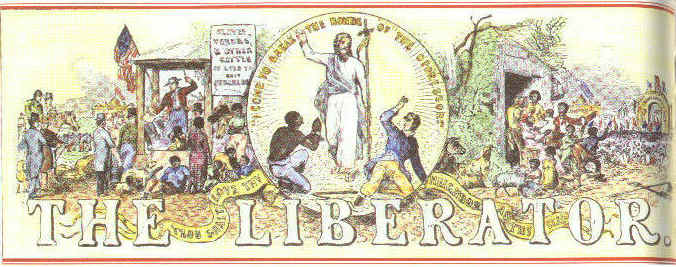
[1841]
Sulla melodia di Auld Lang Syne del poeta scozzese settecentesco Robert Burns.
In “Anti-Slavery Melodies”, raccolta di canti abolizionisti curata da Jairus Lincoln (1794-1882) e stampata da Elijah B. Gill (1808-1874) a Boston nel 1843.
William Lloyd Garrison è stato una delle più importanti figure del movimento americano per l’abolizione della schiavitù. Giornalista, fondò nel 1831 il settimanale “The Liberator”, i cui articoli erano tutti incentrati sulla lotta contro la schiavitù. Due anni più tardi Garrison fu tra i fondatori dell’American Anti-Slavery Society. La sua posizione rispetto alla schiavitù non aveva le “sfumature” di tanti altri abolizionisti moderati suoi contemporanei… Garrison era un non-violento, convinto che la battaglia contro la schiavitù e per l’emancipazione degli afroamericani dovesse essere combattuta con metodi pacifici, ma era al tempo stesso un radicale,... (Continues)
Sulla melodia di Auld Lang Syne del poeta scozzese settecentesco Robert Burns.
In “Anti-Slavery Melodies”, raccolta di canti abolizionisti curata da Jairus Lincoln (1794-1882) e stampata da Elijah B. Gill (1808-1874) a Boston nel 1843.
William Lloyd Garrison è stato una delle più importanti figure del movimento americano per l’abolizione della schiavitù. Giornalista, fondò nel 1831 il settimanale “The Liberator”, i cui articoli erano tutti incentrati sulla lotta contro la schiavitù. Due anni più tardi Garrison fu tra i fondatori dell’American Anti-Slavery Society. La sua posizione rispetto alla schiavitù non aveva le “sfumature” di tanti altri abolizionisti moderati suoi contemporanei… Garrison era un non-violento, convinto che la battaglia contro la schiavitù e per l’emancipazione degli afroamericani dovesse essere combattuta con metodi pacifici, ma era al tempo stesso un radicale,... (Continues)
I am an Abolitionist! I glory in the name;
(Continues)
(Continues)
Contributed by Alessandro 2010/3/18 - 11:45
Song Itineraries:
Racism and Slavery in the USA
Ballata per un eroe

Corrado, che sia questa la strofa mancante?
Stanotte ho dormito poco, e la mente ha lavorato sui ricordi lontani. Ed ecco cosa è emerso dalla memoria remota:
Quando lei arriverà
mi verserò un bicchiere
di quello stesso vino
che annegò i fantasmi
dei tempi di Caino.
E aspetterò l'arrivo
del (pallido?) postino
che busserà tre volte
davanti alla mia porta.
Credo che ci siano delle approssimazioni, specie sull'ultima quartina, però questa può essere un'idea della strofa intermedia.
Ma Farassino non consulta mai i siti che parlano di lui? Non potrebbe darci una mano?
Stanotte ho dormito poco, e la mente ha lavorato sui ricordi lontani. Ed ecco cosa è emerso dalla memoria remota:
Quando lei arriverà
mi verserò un bicchiere
di quello stesso vino
che annegò i fantasmi
dei tempi di Caino.
E aspetterò l'arrivo
del (pallido?) postino
che busserà tre volte
davanti alla mia porta.
Credo che ci siano delle approssimazioni, specie sull'ultima quartina, però questa può essere un'idea della strofa intermedia.
Ma Farassino non consulta mai i siti che parlano di lui? Non potrebbe darci una mano?
Gianni 2010/3/18 - 09:53
C'era un ragazzo che come me amava i Beatles e i Rolling Stones
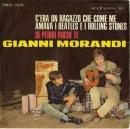
par Riccardo Venturi, 17 mars 2010
Y AVAIT UN KEUM QUI COMME MOI ETC
(Continues)
(Continues)
2010/3/17 - 21:20
With Le roi d'Yvetot, an anti-Napoleonic song written 1813 by Pierre-Jean de Béranger, CCG/AWS goes back to the roots of the modern protest song, arisen in a time when the wars were bleeding France and the whole Europe.
Riccardo Venturi 2010/3/17 - 20:40
C'era un ragazzo che come me amava i Beatles e i Rolling Stones

Voglio questo testo in francese
Di fronte a questa imperiosa richiesta della Martina, come non ubbidire? Però il tipo di francese l'ho scelto io, e non consiglio alla Martina di farlo vedere agli amici o alla prof dicendo che l'ha fatto lei. [RV]
martina fadini 2010/3/17 - 19:29
Jambes minces

Jambes minces
Jambes minces – Marco Valdo M.I. – 2010
Cycle du Cahier ligné – 98
Jambes minces est la nonante-huitième chanson du Cycle du Cahier ligné, constitué d'éléments tirés du Quaderno a Cancelli de Carlo Levi.
Jambes minces, en voilà un drôle de titre, dit l'âne Lucien en esquissant une petite valse. Moi aussi, j'ai les jambes minces et même, si tu regardes le reste de mon corps, comme celui de tous les ânes, sans compter les mulets, les bardots, les chevaux, les girafes, les onagres, les zèbres, les impalas, les biches, les cerfs, les élans... et même, les veaux, les vaches, les bœufs, les moutons, les chèvres... Bref, les ongulés et autres espèces quadrupèdes du même gabarit, excepté les hippopotames, les rhinocéros, les éléphants, les mammouths... Tous ont des jambes minces et même fort minces par rapport à leur corps... Et on n'en fait pas toute une histoire; il n'y a pas... (Continues)
Jambes minces – Marco Valdo M.I. – 2010
Cycle du Cahier ligné – 98
Jambes minces est la nonante-huitième chanson du Cycle du Cahier ligné, constitué d'éléments tirés du Quaderno a Cancelli de Carlo Levi.
Jambes minces, en voilà un drôle de titre, dit l'âne Lucien en esquissant une petite valse. Moi aussi, j'ai les jambes minces et même, si tu regardes le reste de mon corps, comme celui de tous les ânes, sans compter les mulets, les bardots, les chevaux, les girafes, les onagres, les zèbres, les impalas, les biches, les cerfs, les élans... et même, les veaux, les vaches, les bœufs, les moutons, les chèvres... Bref, les ongulés et autres espèces quadrupèdes du même gabarit, excepté les hippopotames, les rhinocéros, les éléphants, les mammouths... Tous ont des jambes minces et même fort minces par rapport à leur corps... Et on n'en fait pas toute une histoire; il n'y a pas... (Continues)
Dans un jardin toujours en deuil,
(Continues)
(Continues)
Contributed by Marco Valdo M.I. 2010/3/17 - 17:26
Βουνά σας χαιρετώ
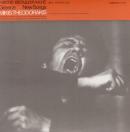
(Direttamente dal testo greco)
17 marzo 2010
17 marzo 2010
ADDIO, ADDIO MONTI
(Continues)
(Continues)
2010/3/17 - 16:39
Αυτοί που θά 'ρθουν μια βραδιά
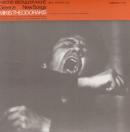
(Direttamente dal testo greco)
17 marzo 2010
17 marzo 2010
ARRIVERANNO UNA SERA
(Continues)
(Continues)
2010/3/17 - 16:30
Ήρθαν οι άνθρωποι με τα μαύρα
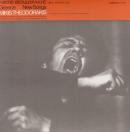
(Direttamente dal testo greco)
17 marzo 2010
17 marzo 2010
VENNERO UOMINI IN NERO
(Continues)
(Continues)
2010/3/17 - 16:22
In fila per tre
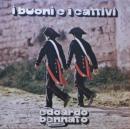
Chanson italienne – In Fila per tre – Edoardo Bennato - 1974
Vois-tu, Lucien l'âne mon ami, l'humanité a inventé une des plus grandes choses qui soit : la patrie, qui pour exister et être complète a besoin d'une école, d'une armée et d'une institution fondement de tout cela : la famille; accessoirement, d'une église. Ceci a été très bien résumé dans une devise – car il y faut aussi une devise : « Travail, Famille, Patrie ». Et comme je te disais, la Famille est centrale. Le tout est enrobé de la sauce « discipline » et la discipline, qui est l'amidon de la hiérarchie et le ciment des armées, fonctionne en rangs. Tel est le sens de cette remarquable chanson.
Voilà qui m'a l'air excellent, dit Lucien l'âne en raidissant sa queue à la verticale comme pour saluer on ne sait quel général qui passerait par là et qui, en tant que bon général, n'oublierait pas de crier : « Garde à vous ! ». Voilà... (Continues)
Vois-tu, Lucien l'âne mon ami, l'humanité a inventé une des plus grandes choses qui soit : la patrie, qui pour exister et être complète a besoin d'une école, d'une armée et d'une institution fondement de tout cela : la famille; accessoirement, d'une église. Ceci a été très bien résumé dans une devise – car il y faut aussi une devise : « Travail, Famille, Patrie ». Et comme je te disais, la Famille est centrale. Le tout est enrobé de la sauce « discipline » et la discipline, qui est l'amidon de la hiérarchie et le ciment des armées, fonctionne en rangs. Tel est le sens de cette remarquable chanson.
Voilà qui m'a l'air excellent, dit Lucien l'âne en raidissant sa queue à la verticale comme pour saluer on ne sait quel général qui passerait par là et qui, en tant que bon général, n'oublierait pas de crier : « Garde à vous ! ». Voilà... (Continues)
EN RANGS PAR TROIS
(Continues)
(Continues)
Contributed by Marco Valdo M.I. 2010/3/17 - 15:53
Canción para mi América
Versione inglese di Barbara Dane da “Cancion Protesta: Protest Songs of Latin America”, Paredon Records, 1970.
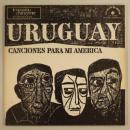
GIVE YOUR HAND TO THE INDIAN
(Continues)
(Continues)
Contributed by Alessandro 2010/3/17 - 13:43
Los vietnamitas son pequeñitos (David y Goliat)
Traduzione inglese come da “Cancion Protesta: Protest Songs of Latin America”, edited by Barbara Dane, Paredon Records, 1970.
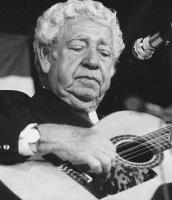
DAVID AND GOLIATH
(Continues)
(Continues)
Contributed by Alessandro 2010/3/17 - 13:24
The Kent State Massacre
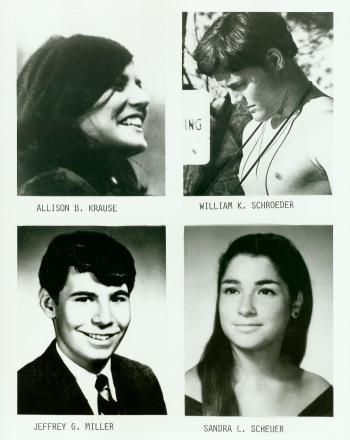
[1970]
Words by Jack Warshaw and Barbara Dane.
Melody from The Death of Harry Simms (Aunt Molly Jackson).
Album “I Hate the Capitalist System”,
Paredon Records, 1973.
“The capitalist system, since its earliest days when little children were employed in the mills and sweatshops, has destroyed its young. In recent times it has demonstrated that it will not tolerate the most modest challenge to its power by murdering students during peaceful demonstrations on campuses.
There is a direct line of continuity from the murders at Orangeburg of Sam Hammon, 18, Delano Middleton, 17, and Henry Smith, 18, to the murders at Jackson State in Mississippi of Phillip Gibbs, 19 and James Green, 17, to the murders at Kent State, Ohio.
The line continues to the needless victimization of hundreds of thousands of their generation who were sent away to fight and die or come home maimed in body or spirit,... (Continues)
Words by Jack Warshaw and Barbara Dane.
Melody from The Death of Harry Simms (Aunt Molly Jackson).
Album “I Hate the Capitalist System”,
Paredon Records, 1973.
“The capitalist system, since its earliest days when little children were employed in the mills and sweatshops, has destroyed its young. In recent times it has demonstrated that it will not tolerate the most modest challenge to its power by murdering students during peaceful demonstrations on campuses.
There is a direct line of continuity from the murders at Orangeburg of Sam Hammon, 18, Delano Middleton, 17, and Henry Smith, 18, to the murders at Jackson State in Mississippi of Phillip Gibbs, 19 and James Green, 17, to the murders at Kent State, Ohio.
The line continues to the needless victimization of hundreds of thousands of their generation who were sent away to fight and die or come home maimed in body or spirit,... (Continues)
Brothers, listen to my story,
(Continues)
(Continues)
Contributed by Alessandro 2010/3/17 - 13:04
Song Itineraries:
War in Viet Nam: Student Protest and Repression
Song Of The Coats
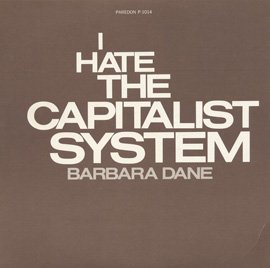
[1968]
Original music and words in vietnamese by Xuan Hong, Việt cộng fighter in southern Vietnam.
English words by Barbara Dane.
Dall’album “I Hate the Capitalist System”, Paredon Records, 1973.
“Written in the southern part of Vietnam in the early '60s, this song was printed in a little pocket songbook carried by the NLF fighters [ossia il Việt cộng] as one of their first gifts to people in the newly liberated villages. It celebrates the dedication of the people working in the little jungle workshops even under the constant threat of bombings and strafings to supply the needs of the fighters. I have had the privilege of singing it in Paris at the giant Tet celebration held in 1972 by the Vietnamese community there, in this English version, and while doing volunteer work with a group of Vietnamese women on a large farm in Cuba when I only knew how to sing the melody without words. Both... (Continues)
Original music and words in vietnamese by Xuan Hong, Việt cộng fighter in southern Vietnam.
English words by Barbara Dane.
Dall’album “I Hate the Capitalist System”, Paredon Records, 1973.
“Written in the southern part of Vietnam in the early '60s, this song was printed in a little pocket songbook carried by the NLF fighters [ossia il Việt cộng] as one of their first gifts to people in the newly liberated villages. It celebrates the dedication of the people working in the little jungle workshops even under the constant threat of bombings and strafings to supply the needs of the fighters. I have had the privilege of singing it in Paris at the giant Tet celebration held in 1972 by the Vietnamese community there, in this English version, and while doing volunteer work with a group of Vietnamese women on a large farm in Cuba when I only knew how to sing the melody without words. Both... (Continues)
Brothers brave the rain and sun,
(Continues)
(Continues)
Contributed by Alessandro 2010/3/17 - 11:54
Song Itineraries:
War in Viet Nam: as seen from Viet Nam
Ho continuato la mia strada

Ciao Claudio, mi ricordo di Voi, ero guida nel TO23 e lasciai Torino proprio in quell'anno, alla volta di Milano. Ho cantanto e suonato la vostra canzone per molti anni ancora...mi chiamo Gabriella.Ho scoperto questo sito attraverso una segnalazione che ho letto su ...quelli che facevano scoutismo nel TO23.Un abbraccio.
2010/3/17 - 00:21
Beatles: A Day In The Life
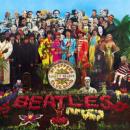
Semplicemente la più grande canzone di tutti i tempi.
L'oscillazione tra la vita, la morte e il sogno hanno qualcosa di inafferrabile e di infinito.
L'oscillazione tra la vita, la morte e il sogno hanno qualcosa di inafferrabile e di infinito.
Andrea 2010/3/16 - 22:22
Lonesome Jailhouse Blues

[193?]
Scritta da Olen Montgomery.
Dall’album “I Hate the Capitalist System”, Paredon Records, 1973.
25 marzo 1931, sulla linea ferroviaria tra Chattanooga e Memphis, Tennessee.
C’è un sacco di gente su quel treno, tantissimi giovani e meno giovani, bianchi e neri, senza un soldo in tasca, che si spostano come “hobos” alla ricerca di qualche lavoro stagionale, come nei campi di cotone a Chattanooga… Su uno dei vagoni scoppia una rissa tra neri e bianchi… i secondi hanno la peggio, saltano giù dal treno e raccontano l’accaduto ad un capo-stazione che avverte lo sceriffo… Intanto sul vagone sono rimasti nove giovani neri e due ragazze bianche… Quando lo sceriffo di Paint Rock, Alabama, li ferma, queste due, per paura di essere arrestate per vagabondaggio, raccontano di essere state sequestrate e ripetutamente stuprate dai ragazzi neri, tutti tra i 13 e i 19 anni.
Siamo nel profondo sud... (Continues)
Scritta da Olen Montgomery.
Dall’album “I Hate the Capitalist System”, Paredon Records, 1973.
25 marzo 1931, sulla linea ferroviaria tra Chattanooga e Memphis, Tennessee.
C’è un sacco di gente su quel treno, tantissimi giovani e meno giovani, bianchi e neri, senza un soldo in tasca, che si spostano come “hobos” alla ricerca di qualche lavoro stagionale, come nei campi di cotone a Chattanooga… Su uno dei vagoni scoppia una rissa tra neri e bianchi… i secondi hanno la peggio, saltano giù dal treno e raccontano l’accaduto ad un capo-stazione che avverte lo sceriffo… Intanto sul vagone sono rimasti nove giovani neri e due ragazze bianche… Quando lo sceriffo di Paint Rock, Alabama, li ferma, queste due, per paura di essere arrestate per vagabondaggio, raccontano di essere state sequestrate e ripetutamente stuprate dai ragazzi neri, tutti tra i 13 e i 19 anni.
Siamo nel profondo sud... (Continues)
All night long I sat in my cell and cried
(Continues)
(Continues)
Contributed by Alessandro 2010/3/16 - 15:08
Song Itineraries:
From World Jails, Racism and Slavery in the USA
Canzone della Libertà (Viva la libertà)
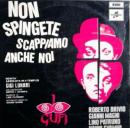
Segnalo la curiosissima cover in chiave "prog" realizzata nei primi anni '80 dal gruppo veneziano Wedding Heart:
per info
www.myspace.com/weddingheart
per info
www.myspace.com/weddingheart
Fabio 2010/3/16 - 14:10
I Hate the Capitalist System
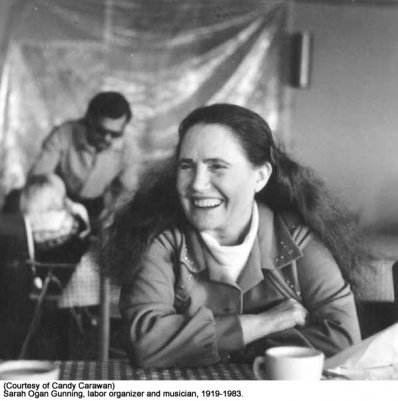
[193?]
Parole e musica di Sarah Ogan Gunning, sorellastra di Aunt Molly Jackson.
Dall’album “Girl of Constant Sorrow”, Folk Legacy Records, 1965.
Riproposta da Barbara Dane nell’album “I Hate the Capitalist System”, Paredon Records, 1973.
“Dedication. This recording is respectfully dedicated to the millions of hard-working people who really made America great, in the sure knowledge that one day they will gather up their strength, their courage and their wisdom, and they will come together to smash this decayed and dying system. They will use their inventiveness and industry to raise all our people to a decent living standard, and restore us to a place of respect among the fellowship of nations. They are the creators of history, and they will construct the socialist future.
Specifically, I want to dedicate these songs to my sister , Julia, who has recently entered that great school... (Continues)
Parole e musica di Sarah Ogan Gunning, sorellastra di Aunt Molly Jackson.
Dall’album “Girl of Constant Sorrow”, Folk Legacy Records, 1965.
Riproposta da Barbara Dane nell’album “I Hate the Capitalist System”, Paredon Records, 1973.
“Dedication. This recording is respectfully dedicated to the millions of hard-working people who really made America great, in the sure knowledge that one day they will gather up their strength, their courage and their wisdom, and they will come together to smash this decayed and dying system. They will use their inventiveness and industry to raise all our people to a decent living standard, and restore us to a place of respect among the fellowship of nations. They are the creators of history, and they will construct the socialist future.
Specifically, I want to dedicate these songs to my sister , Julia, who has recently entered that great school... (Continues)
I hate the capitalist system,
(Continues)
(Continues)
Contributed by Alessandro 2010/3/16 - 13:35
Song Itineraries:
The War of Labour: Emigration, Immigration, Exploitation, Slavery
Bring Them Home (If You Love Your Uncle Sam)

New words [1969] by Barbara Dane and GIs from Ft. Hood, 11/9/69
Album “F.T.A.! Songs et the GI Resistance”, Paredon Records 1970.
Sung by Barbara Dane with active-duty GIs.
Recorded at Fort Hood, Texas, Fort Benning, Georgia and Fort Bragg, North Carolina.
Edited by Irwin Silber.
“F.T.A.”, acronimo per lo slogan pubblicitario dell’esercito “Fun, Travel and Adventure”, durante l’invasione del Vietnam fu utilizzato nell’ambito del movimento contro la guerra con il significato di “Free The Army” o di “Fuck The Army”…
Album “F.T.A.! Songs et the GI Resistance”, Paredon Records 1970.
Sung by Barbara Dane with active-duty GIs.
Recorded at Fort Hood, Texas, Fort Benning, Georgia and Fort Bragg, North Carolina.
Edited by Irwin Silber.
“F.T.A.”, acronimo per lo slogan pubblicitario dell’esercito “Fun, Travel and Adventure”, durante l’invasione del Vietnam fu utilizzato nell’ambito del movimento contro la guerra con il significato di “Free The Army” o di “Fuck The Army”…
BRING 'EM HOME
(Continues)
(Continues)
Contributed by Alessandro 2010/3/16 - 12:07
Last Drink With Don
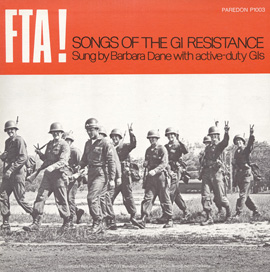
[1970]
Words by Fred Gardner
Music by Barbara Dane
Album “F.T.A.! Songs et the GI Resistance”, Paredon Records
Sung by Barbara Dane with active-duty GIs.
Recorded at Fort Hood, Texas, Fort Benning, Georgia and Fort Bragg, North Carolina.
Edited by Irwin Silber.
“Probably we should have recorded this song with some electric instruments and lots of echo and things, to make it easier to reach out for it from the electronic fantasy world of today‘s records. But I have a personal crusade going to bring back the sound of the human voice. Unretouched, spliced, or vibed up. It's one small battle I fight on the side, probably growing out of the fact that so many times when it's important to go ahead and sing something that will help to change, teach, heal, or move people there just isn't any mike or stage. So even when you're exhausted from marching and rallying, and speaking and travelling,... (Continues)
Words by Fred Gardner
Music by Barbara Dane
Album “F.T.A.! Songs et the GI Resistance”, Paredon Records
Sung by Barbara Dane with active-duty GIs.
Recorded at Fort Hood, Texas, Fort Benning, Georgia and Fort Bragg, North Carolina.
Edited by Irwin Silber.
“Probably we should have recorded this song with some electric instruments and lots of echo and things, to make it easier to reach out for it from the electronic fantasy world of today‘s records. But I have a personal crusade going to bring back the sound of the human voice. Unretouched, spliced, or vibed up. It's one small battle I fight on the side, probably growing out of the fact that so many times when it's important to go ahead and sing something that will help to change, teach, heal, or move people there just isn't any mike or stage. So even when you're exhausted from marching and rallying, and speaking and travelling,... (Continues)
Here's to the butterfly in the tropics of Tonkin,
(Continues)
(Continues)
Contributed by Alessandro 2010/3/16 - 11:48
Insubordination

[1970]
Album “F.T.A.! Songs et the GI Resistance”, Paredon Records
Sung by Barbara Dane with active-duty GIs.
Recorded at Fort Hood, Texas, Fort Benning, Georgia and Fort Bragg, North Carolina.
Edited by Irwin Silber.
“How do you spread your ideas when the radio, the television, the newspapers, the schools, and even the streetcorners seem to be controlled by the people who are controlling you? Start an Alternate U., or a guerrilla theatre, or make up chants that can be easily remembered and passed on.
The best music, in a real functional sense, has always been made without any instruments, arrangements, or rehearsals. This song has all the room you need for new verses, with the essential couple of anchor points of popular agreement. Nobody ever told me afteward that "Yes, I do want somebody over me (or under me), so I won't sing that."
(Nota introduttiva al brano dal libretto che accompagna l’album citato)
Album “F.T.A.! Songs et the GI Resistance”, Paredon Records
Sung by Barbara Dane with active-duty GIs.
Recorded at Fort Hood, Texas, Fort Benning, Georgia and Fort Bragg, North Carolina.
Edited by Irwin Silber.
“How do you spread your ideas when the radio, the television, the newspapers, the schools, and even the streetcorners seem to be controlled by the people who are controlling you? Start an Alternate U., or a guerrilla theatre, or make up chants that can be easily remembered and passed on.
The best music, in a real functional sense, has always been made without any instruments, arrangements, or rehearsals. This song has all the room you need for new verses, with the essential couple of anchor points of popular agreement. Nobody ever told me afteward that "Yes, I do want somebody over me (or under me), so I won't sing that."
(Nota introduttiva al brano dal libretto che accompagna l’album citato)
I know I'm guilty, and I'm proud,
(Continues)
(Continues)
Contributed by Alessandro 2010/3/16 - 11:18
Song Itineraries:
War in Viet Nam as seen from the U.S.
Tombino

dall'album Grand Hotel Cristicchi, una bella canzone per il percorso violenza sui bambini
Cristicchi ha fatto una cover di questo brano che in realtà è di areamag, il quale ha scritto molte canzoni sull'infanzia violata, lo dico giusto per specificare, però nulla da togliere al senso dell'articolo.
(Giuliana)
I bambini di strada di Bucarest sono meno di una volta. Ma solo perché sono cresciuti
dal nostro inviato
Alessandro Ursic
Stazione della metro di Costin Giorgeanu, alla periferia est di Bucarest. Enormi bloc comunisti, tutti grigi, come in mezza capitale ricostruita secondo i canoni gigantisti del regime di Ceauşescu. Dietro un incrocio perennemente trafficato, lungo i binari abbandonati di una ex ferrovia, si estende una boscaglia incolta. “Vieni, vieni dentro. Ti mostro dove vivo”, dice Cătălin, 15 anni. Dopo un centinaio di metri tra le erbacce, qualche lampadina illumina... (Continues)
Cristicchi ha fatto una cover di questo brano che in realtà è di areamag, il quale ha scritto molte canzoni sull'infanzia violata, lo dico giusto per specificare, però nulla da togliere al senso dell'articolo.
(Giuliana)
I bambini di strada di Bucarest sono meno di una volta. Ma solo perché sono cresciuti
dal nostro inviato
Alessandro Ursic
Stazione della metro di Costin Giorgeanu, alla periferia est di Bucarest. Enormi bloc comunisti, tutti grigi, come in mezza capitale ricostruita secondo i canoni gigantisti del regime di Ceauşescu. Dietro un incrocio perennemente trafficato, lungo i binari abbandonati di una ex ferrovia, si estende una boscaglia incolta. “Vieni, vieni dentro. Ti mostro dove vivo”, dice Cătălin, 15 anni. Dopo un centinaio di metri tra le erbacce, qualche lampadina illumina... (Continues)
Tombino, chiamato così fin da ragazzino,
(Continues)
(Continues)
Contributed by DonQuijote82 2010/3/16 - 11:15
Song Itineraries:
Child Abuse
The Resistance Hymn

[1970]
Tune: “Patriot Game”
Words: adopted by Barbara Dane from "The Hallo People"
Album “F.T.A.! Songs et the GI Resistance”, Paredon Records
Sung by Barbara Dane with active-duty GIs.
Recorded at Fort Hood, Texas, Fort Benning, Georgia and Fort Bragg, North Carolina.
Edited by Irwin Silber.
“This song was made up for draft resisters, and that's how it got its name. But since then, a whole blossoming movement of resisters inside the Army has come to light, and this song has served there too. I'll never forget the night I was teaching it to a meeting of sailors and marines in San Diego, who were organizing a new branch of the Movement for a Democratic Military, early in 1970. Inside the little store-front meeting place, I was telling the guys not to sing the part in the chorus wrong where it says "I've got something I’ll die for, what else can they do." It's drummed into people's heads... (Continues)
Tune: “Patriot Game”
Words: adopted by Barbara Dane from "The Hallo People"
Album “F.T.A.! Songs et the GI Resistance”, Paredon Records
Sung by Barbara Dane with active-duty GIs.
Recorded at Fort Hood, Texas, Fort Benning, Georgia and Fort Bragg, North Carolina.
Edited by Irwin Silber.
“This song was made up for draft resisters, and that's how it got its name. But since then, a whole blossoming movement of resisters inside the Army has come to light, and this song has served there too. I'll never forget the night I was teaching it to a meeting of sailors and marines in San Diego, who were organizing a new branch of the Movement for a Democratic Military, early in 1970. Inside the little store-front meeting place, I was telling the guys not to sing the part in the chorus wrong where it says "I've got something I’ll die for, what else can they do." It's drummed into people's heads... (Continues)
They say I was born in the lend of the free.
(Continues)
(Continues)
Contributed by Alessandro 2010/3/16 - 11:07
We Shall Not Be Moved
Anonymous
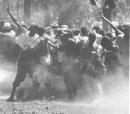
Sung by Barbara Dane with active-duty GIs.
Recorded at Fort Hood, Texas, Fort Benning, Georgia and Fort Bragg, North Carolina.
Edited by Irwin Silber.
Come spiega qui la stessa Barbara Dane, si tratta di una versione che raccoglie insieme strofe usate come slogan nel corso di diverse manifestazioni di protesta in diverse parti del mondo… Il riferimento ad Henry Ford fa pensare alle proteste americane contro il complesso militare-industriale durante la guerra in Vienam; “Polaris” era il nome di un missile balistico nucleare americano usato a partire dagli anni 60 dalla U.S Navy, successivamente anche dalla Royal Navy britannica… qualcuno arrivò pure da noi per essere montato sulla fregata Giuseppe Garibaldi, ma la cosa non ebbe seguito (anche se qualcuno di quei Polaris ancora se ne sta nell’Arsenale a La Spezia..); la strofa in italiano rimanda alle nostrane proteste ben descritte in Le... (Continues)
Recorded at Fort Hood, Texas, Fort Benning, Georgia and Fort Bragg, North Carolina.
Edited by Irwin Silber.
Come spiega qui la stessa Barbara Dane, si tratta di una versione che raccoglie insieme strofe usate come slogan nel corso di diverse manifestazioni di protesta in diverse parti del mondo… Il riferimento ad Henry Ford fa pensare alle proteste americane contro il complesso militare-industriale durante la guerra in Vienam; “Polaris” era il nome di un missile balistico nucleare americano usato a partire dagli anni 60 dalla U.S Navy, successivamente anche dalla Royal Navy britannica… qualcuno arrivò pure da noi per essere montato sulla fregata Giuseppe Garibaldi, ma la cosa non ebbe seguito (anche se qualcuno di quei Polaris ancora se ne sta nell’Arsenale a La Spezia..); la strofa in italiano rimanda alle nostrane proteste ben descritte in Le... (Continues)
WE SHALL NOT BE MOVED
(Continues)
(Continues)
Contributed by Alessandro 2010/3/16 - 10:25
Just Another Day
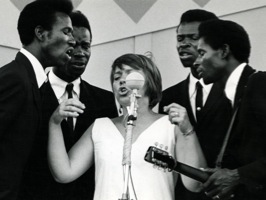
[1970]
Words and music by Bill Frederick, student in chemistry and draft resister at the time of the Vietnam War.
Album “F.T.A.! Songs et the GI Resistance”, Paredon Records
Sung by Barbara Dane with active-duty GIs.
Recorded at Fort Hood, Texas, Fort Benning, Georgia and Fort Bragg, North Carolina.
Edited by Irwin Silber.
“The writer of this song is a draft resister, an advanced student in chemistry, and one of the first songwriters to express a genuine sensitivity to the situation of the Vietnamese in the late '60s. Most of us have had so much conditioning the other way that when I sing this song people are very conflicted about how to respond. GIs will clap rather self-consciously, and one room full of atomic-energy scientists couldn't clap at all. I wish we had a better-recorded version of such a good song, but since all of us who worked on the album are activists, we were all... (Continues)
Words and music by Bill Frederick, student in chemistry and draft resister at the time of the Vietnam War.
Album “F.T.A.! Songs et the GI Resistance”, Paredon Records
Sung by Barbara Dane with active-duty GIs.
Recorded at Fort Hood, Texas, Fort Benning, Georgia and Fort Bragg, North Carolina.
Edited by Irwin Silber.
“The writer of this song is a draft resister, an advanced student in chemistry, and one of the first songwriters to express a genuine sensitivity to the situation of the Vietnamese in the late '60s. Most of us have had so much conditioning the other way that when I sing this song people are very conflicted about how to respond. GIs will clap rather self-consciously, and one room full of atomic-energy scientists couldn't clap at all. I wish we had a better-recorded version of such a good song, but since all of us who worked on the album are activists, we were all... (Continues)
There is a little haze in the morning air.
(Continues)
(Continues)
Contributed by Alessandro 2010/3/16 - 09:20
Song Itineraries:
War in Viet Nam as seen from the U.S.
Mosh

Non mi è mai piaciuto vedere le Twin Towers accasciarsi l'una sull'altra e pensare a quante persone c'erano dentro, ma se veramente la guerra in Iraq è stata combattuta per instaurare la democrazia in quel paese, allora 3 quarti del mondo sarebbero sotto una guerra, EMINEM 4 EVER!!!!!!!!!!!!!!!!!!!!!!!!!!!!!!
Loris 2010/3/15 - 19:42
Giovanna d'Arco

1994
Domenica e lunedì
Il testo di Paola Pallottino raccoglie molti degli elementi caratterizzanti la vicenda umana di Giovanna d'Arco, dalle visioni alle "voci", dalla scelta di armarsi alla consapevolezza di avere una missione da compiere. Una missione che costerà la vita alla contadina lorenese, al termine di un processo in cui i massimi teologi del tempo furono mobilitati per dichiararla eretica.
La fama di Giovanna vergine combattente, già alta durante la sua vita, fu tutt'altro che offuscata dalla fine riservatale, con la quale la supremazia inglese intendeva scoraggiare ogni dissenso: eroina popolare, appena l'influenza inglese sulla Francia iniziò a scemare fu riabilitata da un successivo processo (1456) e poi, al termine di una vicenda in cui il piano religioso si è intrecciato spesso a quello delle istanze e delle rivendicazioni nazionaliste (gli intenti antiinglesi con cui il... (Continues)
Domenica e lunedì
Il testo di Paola Pallottino raccoglie molti degli elementi caratterizzanti la vicenda umana di Giovanna d'Arco, dalle visioni alle "voci", dalla scelta di armarsi alla consapevolezza di avere una missione da compiere. Una missione che costerà la vita alla contadina lorenese, al termine di un processo in cui i massimi teologi del tempo furono mobilitati per dichiararla eretica.
La fama di Giovanna vergine combattente, già alta durante la sua vita, fu tutt'altro che offuscata dalla fine riservatale, con la quale la supremazia inglese intendeva scoraggiare ogni dissenso: eroina popolare, appena l'influenza inglese sulla Francia iniziò a scemare fu riabilitata da un successivo processo (1456) e poi, al termine di una vicenda in cui il piano religioso si è intrecciato spesso a quello delle istanze e delle rivendicazioni nazionaliste (gli intenti antiinglesi con cui il... (Continues)
L’Angelo Michele primo ti parlò;
(Continues)
(Continues)
Contributed by Io non sto con Oriana 2010/3/15 - 15:23
Buffalo Soldier

Un mito, una leggenda..
Con così poco che ha avuto..
Bob ti stimo :)
Con così poco che ha avuto..
Bob ti stimo :)
BettaStarr 2010/3/15 - 14:13
Join the GI Movement

[1970]
Words by Barbara Dane
Based on Aunt Molly Jackson' "I Am a Union Woman" (1931)
Album “F.T.A.! Songs et the GI Resistance”, Paredon Records
Sung by Barbara Dane with active-duty GIs.
Recorded at Fort Hood, Texas, Fort Benning, Georgia and Fort Bragg, North Carolina.
Edited by Irwin Silber.
“Back in the early '30s a great singing organizer in the bloody mine battles was Aunt Molly Jackson. She was the sister of two other great people's singers and fighters, Jim Garland and Sarah Ogan Gunning. The whole family was blacklisted from work because of their union activities, and they finally had to move away from Harlan County just to live. But their legacy of songs has stayed with us and keeps on being useful, wherever people are finding the strength and courage to fight for their rights. It seemed to me that this old chorus which used to be "Join the CIO" would help the guys who... (Continues)
Words by Barbara Dane
Based on Aunt Molly Jackson' "I Am a Union Woman" (1931)
Album “F.T.A.! Songs et the GI Resistance”, Paredon Records
Sung by Barbara Dane with active-duty GIs.
Recorded at Fort Hood, Texas, Fort Benning, Georgia and Fort Bragg, North Carolina.
Edited by Irwin Silber.
“Back in the early '30s a great singing organizer in the bloody mine battles was Aunt Molly Jackson. She was the sister of two other great people's singers and fighters, Jim Garland and Sarah Ogan Gunning. The whole family was blacklisted from work because of their union activities, and they finally had to move away from Harlan County just to live. But their legacy of songs has stayed with us and keeps on being useful, wherever people are finding the strength and courage to fight for their rights. It seemed to me that this old chorus which used to be "Join the CIO" would help the guys who... (Continues)
I am a GI rebel,
(Continues)
(Continues)
Contributed by Alessandro 2010/3/15 - 13:53
Hard Times in Colman's Mines
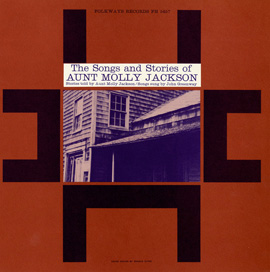
[1910]
Songs sung by John Greenway
Album “The Songs and Stories of Aunt Molly Jackson”, Folkways Records, 1961.
“This is a song I composed in 19 and l0 at a mining company in Bell County, Kentucky, when I was trying to get the miners to come out in strike for eight hours and better pay, and for decent homes to live in. I would sing this song and then I would make a long speech, and this way I organized that group of miners while they was in my reach. Colman was the name of the coal operator. He was working over 400 men in this way in 19 and l0. This song will tell you the awful condition the miners was in”
(dal libretto che accompagna il disco)
Songs sung by John Greenway
Album “The Songs and Stories of Aunt Molly Jackson”, Folkways Records, 1961.
“This is a song I composed in 19 and l0 at a mining company in Bell County, Kentucky, when I was trying to get the miners to come out in strike for eight hours and better pay, and for decent homes to live in. I would sing this song and then I would make a long speech, and this way I organized that group of miners while they was in my reach. Colman was the name of the coal operator. He was working over 400 men in this way in 19 and l0. This song will tell you the awful condition the miners was in”
(dal libretto che accompagna il disco)
Come out on strike, boys, it's all you can do;
(Continues)
(Continues)
Contributed by Alessandro 2010/3/15 - 13:12
Song Itineraries:
The War of Labour: Emigration, Immigration, Exploitation, Slavery
×
![]()

